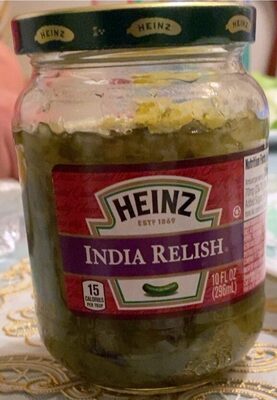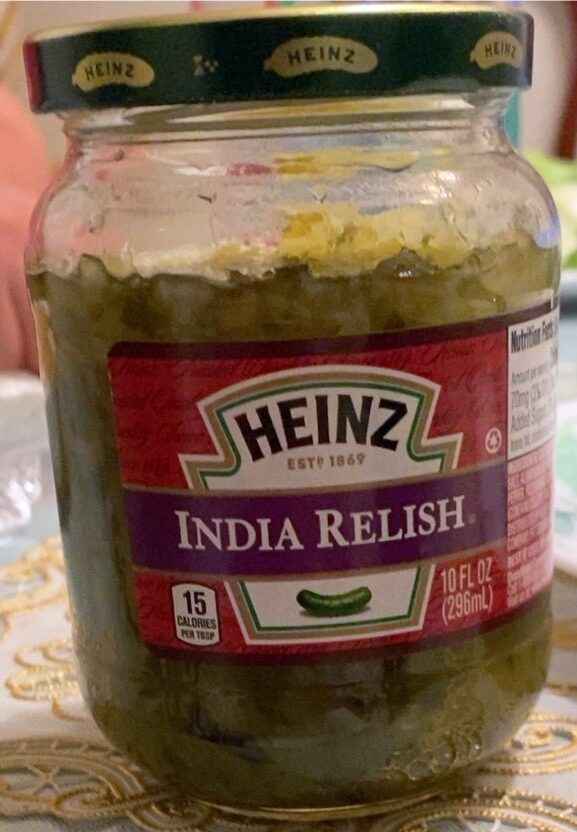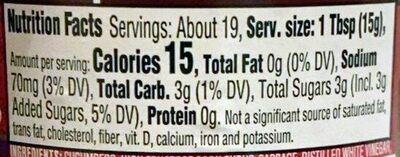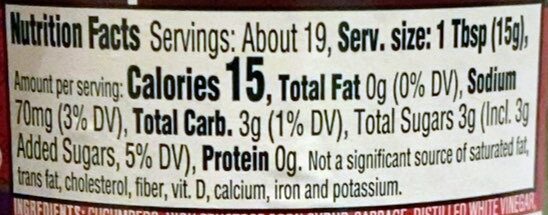Help us make food transparency the norm!
As a non-profit organization, we depend on your donations to continue informing consumers around the world about what they eat.
The food revolution starts with you!
India Relish - Heinz - 10 fl oz (296 ml)
India Relish - Heinz - 10 fl oz (296 ml)
Ambiguous barcode: This product has a Restricted Circulation Number barcode for products within a company. This means that different producers and stores can use the same barcode for different products.
×
This product page is not complete. You can help to complete it by editing it and adding more data from the photos we have, or by taking more photos using the app for Android or iPhone/iPad. Thank you!
×
Barcode: 01362408
Common name: sauce with crunchy pickled cucumber and cabbage immersed in vinegar.
Quantity: 10 fl oz (296 ml)
Brands: Heinz
Categories: Condiments, Sauces, Burger sauces, Indian-sauces
Labels, certifications, awards:
Kosher, Contains GMOs, Orthodox Union Kosher
Origin of ingredients: United States
Manufacturing or processing places: Pittsburgh, Pennsylvania, Estados Unidos
Traceability code: 020503190007
Link to the product page on the official site of the producer: https://www.heinz.com/products/000130000...
Countries where sold: Bolivia, United States
Matching with your preferences
Health
Ingredients
-
12 ingredients
CUCUMBERS, HIGH FRUCTOSE CORN SYRUP, CABBAGE, DISTILLED WHITE VINEGAR, SALT, ALUMINUM SULFATE, XANTHAN GUM, DRIED RED BELL PEPPER, POLYSORBATE 80, NATURAL AND ARTIFICIAL FLAVOR (CELERY), FD&C YELLOW NO 5, FD&C BLUE NO 1.Allergens: Celery
Food processing
-
Ultra processed foods
Elements that indicate the product is in the 4 - Ultra processed food and drink products group:
- Additive: E102 - Tartrazine
- Additive: E133 - Brilliant blue FCF
- Additive: E415 - Xanthan gum
- Additive: E433 - Polyoxyethylene sorbitan monooleate
- Ingredient: Flavouring
- Ingredient: Glucose
- Ingredient: High fructose corn syrup
Food products are classified into 4 groups according to their degree of processing:
- Unprocessed or minimally processed foods
- Processed culinary ingredients
- Processed foods
- Ultra processed foods
The determination of the group is based on the category of the product and on the ingredients it contains.
Additives
-
E102 - Tartrazine
Tartrazine: Tartrazine is a synthetic lemon yellow azo dye primarily used as a food coloring. It is also known as E number E102, C.I. 19140, FD&C Yellow 5, Acid Yellow 23, Food Yellow 4, and trisodium 1--4-sulfonatophenyl--4--4-sulfonatophenylazo--5-pyrazolone-3-carboxylate-.Tartrazine is a commonly used color all over the world, mainly for yellow, and can also be used with Brilliant Blue FCF -FD&C Blue 1, E133- or Green S -E142- to produce various green shades.Source: Wikipedia
-
E133 - Brilliant blue FCF
Brilliant Blue FCF: Brilliant Blue FCF -Blue 1- is an organic compound classified as a triarylmethane dye and a blue azo dye, reflecting its chemical structure. Known under various commercial names, it is a colorant for foods and other substances. It is denoted by E number E133 and has a color index of 42090. It has the appearance of a blue powder. It is soluble in water, and the solution has a maximum absorption at about 628 nanometers.Source: Wikipedia
-
E415 - Xanthan gum
Xanthan gum (E415) is a natural polysaccharide derived from fermented sugars, often used in the food industry as a thickening and stabilizing agent.
This versatile food additive enhances texture and prevents ingredient separation in a wide range of products, including salad dressings, sauces, and gluten-free baked goods.
It is considered safe for consumption even at high intake amounts.
-
E433 - Polyoxyethylene sorbitan monooleate
Polysorbate 80: Polysorbate 80 is a nonionic surfactant and emulsifier often used in foods and cosmetics. This synthetic compound is a viscous, water-soluble yellow liquid.Source: Wikipedia
-
E520 - Aluminium sulphate
Aluminium sulfate: Aluminium sulfate is a chemical compound with the formula Al2-SO4-3. It is soluble in water and is mainly used as a coagulating agent -promoting particle collision by neutralizing charge- in the purification of drinking water and waste water treatment plants, and also in paper manufacturing. The anhydrous form occurs naturally as a rare mineral millosevichite, found e.g. in volcanic environments and on burning coal-mining waste dumps. Aluminium sulfate is rarely, if ever, encountered as the anhydrous salt. It forms a number of different hydrates, of which the hexadecahydrate Al2-SO4-3•16H2O and octadecahydrate Al2-SO4-3•18H2O are the most common. The heptadecahydrate, whose formula can be written as [Al-H2O-6]2-SO4-3•5H2O, occurs naturally as the mineral alunogen. Aluminium sulfate is sometimes called alum or papermaker's alum in certain industries. However, the name "alum" is more commonly and properly used for any double sulfate salt with the generic formula XAl-SO4-2·12H2O, where X is a monovalent cation such as potassium or ammonium.Source: Wikipedia
Ingredients analysis
-
May contain palm oil
Ingredients that may contain palm oil: E433
-
Maybe vegan
Ingredients that may not be vegan: E433, Natural and artificial flavouring
-
Maybe vegetarian
Ingredients that may not be vegetarian: E433, Natural and artificial flavouring
-
Details of the analysis of the ingredients
en: CUCUMBERS, HIGH FRUCTOSE CORN SYRUP, CABBAGE, DISTILLED WHITE VINEGAR, SALT, ALUMINUM SULFATE, XANTHAN GUM, RED BELL PEPPER, POLYSORBATE 80, NATURAL and ARTIFICIAL FLAVOR, FD&C YELLOW NO 5, FD&C BLUE NO 1- CUCUMBERS -> en:cucumber - vegan: yes - vegetarian: yes - percent_min: 8.33333333333333 - percent_max: 100
- HIGH FRUCTOSE CORN SYRUP -> en:high-fructose-corn-syrup - vegan: yes - vegetarian: yes - ciqual_food_code: 31077 - percent_min: 0 - percent_max: 50
- CABBAGE -> en:cabbage - vegan: yes - vegetarian: yes - percent_min: 0 - percent_max: 33.3333333333333
- DISTILLED WHITE VINEGAR -> en:white-distilled-vinegar - vegan: yes - vegetarian: yes - ciqual_food_code: 11018 - percent_min: 0 - percent_max: 25
- SALT -> en:salt - vegan: yes - vegetarian: yes - ciqual_food_code: 11058 - percent_min: 0 - percent_max: 1.17
- ALUMINUM SULFATE -> en:e520 - vegan: yes - vegetarian: yes - percent_min: 0 - percent_max: 1.17
- XANTHAN GUM -> en:e415 - vegan: yes - vegetarian: yes - percent_min: 0 - percent_max: 1.17
- RED BELL PEPPER -> en:red-bell-pepper - vegan: yes - vegetarian: yes - ciqual_food_code: 20087 - percent_min: 0 - percent_max: 1.17
- POLYSORBATE 80 -> en:e433 - vegan: maybe - vegetarian: maybe - from_palm_oil: maybe - percent_min: 0 - percent_max: 1.17
- NATURAL and ARTIFICIAL FLAVOR -> en:natural-and-artificial-flavouring - vegan: maybe - vegetarian: maybe - percent_min: 0 - percent_max: 1.17
- FD&C YELLOW NO 5 -> en:e102 - vegan: yes - vegetarian: yes - percent_min: 0 - percent_max: 1.17
- FD&C BLUE NO 1 -> en:e133 - vegan: yes - vegetarian: yes - percent_min: 0 - percent_max: 1.17
Nutrition
-
Average nutritional quality
⚠ ️Warning: the amount of fruits, vegetables and nuts is not specified on the label, it was estimated from the list of ingredients: 66This product is not considered a beverage for the calculation of the Nutri-Score.
Positive points: 2
- Proteins: 0 / 5 (value: 0, rounded value: 0)
- Fiber: 0 / 5 (value: 0, rounded value: 0)
- Fruits, vegetables, nuts, and colza/walnut/olive oils: 2 / 5 (value: 66.21, rounded value: 66.2)
Negative points: 10
- Energy: 1 / 10 (value: 420, rounded value: 420)
- Sugars: 4 / 10 (value: 20, rounded value: 20)
- Saturated fat: 0 / 10 (value: 0, rounded value: 0)
- Sodium: 5 / 10 (value: 467, rounded value: 467)
The points for proteins are counted because the negative points are less than 11.
Nutritional score: (10 - 2)
Nutri-Score:
-
Nutrient levels
-
Fat in low quantity (0%)
What you need to know- A high consumption of fat, especially saturated fats, can raise cholesterol, which increases the risk of heart diseases.
Recommendation: Limit the consumption of fat and saturated fat- Choose products with lower fat and saturated fat content.
-
Sugars in high quantity (20%)
What you need to know- A high consumption of sugar can cause weight gain and tooth decay. It also augments the risk of type 2 diabetes and cardio-vascular diseases.
Recommendation: Limit the consumption of sugar and sugary drinks- Sugary drinks (such as sodas, fruit beverages, and fruit juices and nectars) should be limited as much as possible (no more than 1 glass a day).
- Choose products with lower sugar content and reduce the consumption of products with added sugars.
-
Salt in moderate quantity (1.17%)
What you need to know- A high consumption of salt (or sodium) can cause raised blood pressure, which can increase the risk of heart disease and stroke.
- Many people who have high blood pressure do not know it, as there are often no symptoms.
- Most people consume too much salt (on average 9 to 12 grams per day), around twice the recommended maximum level of intake.
Recommendation: Limit the consumption of salt and salted food- Reduce the quantity of salt used when cooking, and don't salt again at the table.
- Limit the consumption of salty snacks and choose products with lower salt content.
-
-
Nutrition facts
Nutrition facts As sold
for 100 g / 100 mlAs sold
per serving (1 tbsp 15 g)Compared to: Indian-sauces Energy 420 kj
(100 kcal)63 kj
(15 kcal)-18% Fat 0 g 0 g -100% Saturated fat - - Carbohydrates 20 g 3 g +92% Sugars 20 g 3 g +270% Added sugars 20 g 3 g Fiber - - Proteins 0 g 0 g -100% Salt 1.17 g 0.175 g -13% Fruits‚ vegetables‚ nuts and rapeseed‚ walnut and olive oils (estimate from ingredients list analysis) 66.21 % 66.21 %
Environment
-
Eco-Score C - Moderate environmental impact
⚠ ️Select a country in order to include the full impact of transportation.The Eco-Score is an experimental score that summarizes the environmental impacts of food products.→ The Eco-Score was initially developped for France and it is being extended to other European countries. The Eco-Score formula is subject to change as it is regularly improved to make it more precise and better suited to each country.Life cycle analysis
-
Average impact of products of the same category: C (Score: 54/100)
Category: Burger sauce, prepacked
Category: Burger sauce, prepacked
- PEF environmental score: 0.50 (the lower the score, the lower the impact)
- including impact on climate change: 3.01 kg CO2 eq/kg of product
Stage Impact Agriculture
72.4 %Processing
13.6 %Packaging
5.3 %Transportation
6.3 %Distribution
1.9 %Consumption
0.5 %
Bonuses and maluses
-
Origins of ingredients with a medium impact
Bonus: +1
Environmental policy: +1
Transportation: 0
Origin of the product and/or its ingredients % of ingredients Impact United States 100 %Medium
-
Packaging with a low impact
Malus: -4
Shape Material Recycling Impact 1 Jar Clear Glass Recycle Low 1 Lid Metal Recycle High 1 Label Paper Recycle Low ⚠ ️ The information about the packaging of this product is not sufficiently precise (exact shapes and materials of all components of the packaging).⚠ ️ For a more precise calculation of the Eco-Score, you can modify the product page and add them.
If you are the manufacturer of this product, you can send us the information with our free platform for producers.
Eco-Score for this product
-
Impact for this product: C (Score: 51/100)
Product: India Relish - Heinz - 10 fl oz (296 ml)
Life cycle analysis score: 54
Sum of bonuses and maluses: -3
Final score: 51/100
-
Carbon footprint
-
Equal to driving 1.6 km in a petrol car
301 g CO² per 100g of product
The carbon emission figure comes from ADEME's Agribalyse database, for the category: Burger sauce, prepacked (Source: ADEME Agribalyse Database)
Stage Impact Agriculture
65.3 %Processing
13.0 %Packaging
8.0 %Transportation
12.2 %Distribution
1.3 %Consumption
0.2 %
Packaging
-
Packaging with a low impact
-
Packaging parts
1 x Jar (Clear Glass)
1 x Lid (Metal)
1 x Label (Paper)
-
Packaging materials
Material % Packaging weight Packaging weight per 100 g of product Paper or cardboard Glass Metal Total
-
Transportation
-
Origins of ingredients
Origins of ingredients with a medium impact
Origin of the product and/or its ingredients % of ingredients Impact United States 100 %Medium
Report a problem
-
Incomplete or incorrect information?
Category, labels, ingredients, allergens, nutritional information, photos etc.
If the information does not match the information on the packaging, please complete or correct it. Open Food Facts is a collaborative database, and every contribution is useful for all.
Data sources
Product added on by foodless
Last edit of product page on by 5m4u9.
Product page also edited by charlesnepote, kiliweb, yuka.sY2b0xO6T85zoF3NwEKvlhFICMjdhBDhBTHWu1HSxdCtKJ7DetsruJT9b6s.













